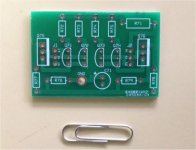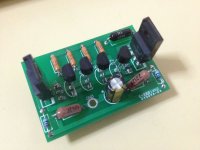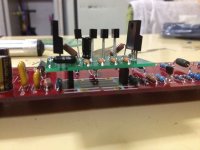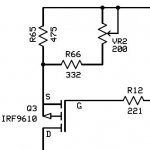Hehe, I was JUST thinking of the same when i saw this thread!!
Please report what differences you find in sound, as I´m going to build a pair of Aleph 2´s myself as soon as I find a pcb/gerber file that is as close as possible to the NP Aleph 2 layout... And don´t cost an arm and a leg to buy as KKs pcbs do..
Please report what differences you find in sound, as I´m going to build a pair of Aleph 2´s myself as soon as I find a pcb/gerber file that is as close as possible to the NP Aleph 2 layout... And don´t cost an arm and a leg to buy as KKs pcbs do..
the boards i mean. etching them.
I’m seriously considering etching the boards myself, in a local store there are a kind of thermal paper that you print on a laser printer and after with the use of an iron you transfer the circuit to the copper side of the PCB. After that the process continues as usual.
Hehe, I was JUST thinking of the same when i saw this thread!!
Please report what differences you find in sound, as I´m going to build a pair of Aleph 2´s myself as soon as I find a pcb/gerber file that is as close as possible to the NP Aleph 2 layout... And don´t cost an arm and a leg to buy as KKs pcbs do..
That’s is the idea and the benefit of using a daughterboard is that I can easily swap between IRF9610’s and JFets without need to solder or unscrew anything, that will permit to make “A – B” listening tests easily. I will test as soon I get the JFets and the boards. I have some audiophile friends that will be happy to join me for the tests to have more than one opinion.
diy pcbs - as most fun solution - that's the best
etch outside , head well away from (not so visible) fumes
regarding fast swap - you forgot that you need entire biasing/offset procedure each time , when you change anything related to FE
in fact , Aleph CCS (resistor for Iq ) doesn't need fiddling - once set , but drain resistor (pot) in LTP will need correction
etch outside , head well away from (not so visible) fumes
regarding fast swap - you forgot that you need entire biasing/offset procedure each time , when you change anything related to FE
in fact , Aleph CCS (resistor for Iq ) doesn't need fiddling - once set , but drain resistor (pot) in LTP will need correction
Last edited:
Some news update
Spencer from FetAudio answer me yesterday, the order for the JFets is ready so I'm waiting that it arrives (about 3 weeks more).
Tomorrow I will have a final quote for the boards, the guy that do it have a good reputation on his work, so I hope that everithing go well with PCBs.
Regards,
Alejandro
Spencer from FetAudio answer me yesterday, the order for the JFets is ready so I'm waiting that it arrives (about 3 weeks more).
Tomorrow I will have a final quote for the boards, the guy that do it have a good reputation on his work, so I hope that everithing go well with PCBs.
Regards,
Alejandro
diy pcbs - as most fun solution - that's the best
etch outside , head well away from (not so visible) fumes
regarding fast swap - you forgot that you need entire biasing/offset procedure each time , when you change anything related to FE
in fact , Aleph CCS (resistor for Iq ) doesn't need fiddling - once set , but drain resistor (pot) in LTP will need correction
Your are right!, I still have too much to learn
yup
no free lunch
but , good thing is that you'll notice change to better ....... so why going back ?
friends will must trust your word
I have read many posts and blog entries talking about how JFets affect the overall sound of an amplifier, like you I’m completely convinced that will sound better, my only doubt is how much will be and what will be the most highlighted characteristic.
I think my friend will want to stay here waiting to hear both (9610's & JFets), I will need more beers and a couple of extra wine bottles.
Some news updates
Las week finally I had received the jfets from Spencer, also the daughterboard arrives from Asia too.
I was able to export to Gerber the design that already made on ExpressPCB using the Copper Connection application from Robot Room (Copper Connection PCB Editor - Robot Room), it open to me a wide range of PCB suppliers, the application is really easy to use and it's really cheap.
I decide to first make one test daughterboard using only "spare jfets" to avoid damage in case of a design error. I use very unmatched LSJ74 b-grade, the assembly took to me about 1 hour. Also I replace on the Aleph-2 main board, the single resistor R11 (offset adjunst) by 2 resistors in parallel plus a trim pot with the same values that Graeme used in his Aleph-X 100J design.
On the first image is the board, the resistors should be larger to be able to acommodate bigger ones, like Dale RN55 or RN60 series, beginner mistake.
The second image shows the populated test daughterboard, and the third is the board finally mounted on the Aleph 2 main board. The spacing was perfect, so they fit without problems.
At power on the most important was no burn component , the offset with the jfets installed start on +12mv and it begins to decrease to -16mv (with IRF9610 normally start on +8 and decrease near to zero). I wait about one hour, take some electrical measurements, all seems to be fine.
, the offset with the jfets installed start on +12mv and it begins to decrease to -16mv (with IRF9610 normally start on +8 and decrease near to zero). I wait about one hour, take some electrical measurements, all seems to be fine.
I connect the speakers and a audio source, it sounds, nothing strange happens. I still need to measure the temperature of the components, but it seems to be into a reasonable ranges.
I expect this weekend to build the final boards with matched jfets, install it on both channels and make some listening tests.
Thanks to all that colaborate to make this possible.
Regards,
Alejandro
Las week finally I had received the jfets from Spencer, also the daughterboard arrives from Asia too.
I was able to export to Gerber the design that already made on ExpressPCB using the Copper Connection application from Robot Room (Copper Connection PCB Editor - Robot Room), it open to me a wide range of PCB suppliers, the application is really easy to use and it's really cheap.
I decide to first make one test daughterboard using only "spare jfets" to avoid damage in case of a design error. I use very unmatched LSJ74 b-grade, the assembly took to me about 1 hour. Also I replace on the Aleph-2 main board, the single resistor R11 (offset adjunst) by 2 resistors in parallel plus a trim pot with the same values that Graeme used in his Aleph-X 100J design.
On the first image is the board, the resistors should be larger to be able to acommodate bigger ones, like Dale RN55 or RN60 series, beginner mistake.
The second image shows the populated test daughterboard, and the third is the board finally mounted on the Aleph 2 main board. The spacing was perfect, so they fit without problems.
At power on the most important was no burn component
I connect the speakers and a audio source, it sounds, nothing strange happens. I still need to measure the temperature of the components, but it seems to be into a reasonable ranges.
I expect this weekend to build the final boards with matched jfets, install it on both channels and make some listening tests.
Thanks to all that colaborate to make this possible.
Regards,
Alejandro
Attachments
......
Could you master the DC offset?
.......
nothing to master
everything less than 30 to 50mV in temp equilibrium is perfect
It would be very interesting to hear you describe the results sonically. What are the advantages and disadvantages sonically.
Could you master the DC offset?
Is very excited to hear the results of your modifications.
well done Alejandro
It’s has been a long time that I don’t look this thread, too much work and little time for hobby, also I had spent my free time in two projects, a preamp based on UGS with Lightspeed LDR attenuator, and a phono preamp based on L'Pacific RIAA made by Salas with some modifications added by me.
About Aleph 2J sound, my subjective opinion is that the presentation is more open, the sound do dot appears to come from speakers, present a better soundstage, more warner than the original, excellent voices and medium, good bass, high are less than I expect but still really good. I had tested it with a Primare Pre-30 and a Plinius M8, and also with my P2P prototype of UGS preamp, by far the Aleph 2J / UGS preamp is best sounding combination, by large margin.
I think the sound could be improved using better resistors and/or capacitors, but first I had to finish my current projects and maybe the next year I will begin working on an Aleph-JX.
When I first changed the front-end to JFets the DC offset was raised a little out of a reasonable margin, I was warned by Zen Mod about that, so I replaced the R11 (221R) resistor with a combination of a two resistors (R65 & R66) and a trim pot (VR2), see attached image, this let me adjust the DC offset to near +/- 5mV, but after a long period of more than 2 hours after the amplifier get warn, the JFets tend to change a lot with temp drift.
I think if you have an Aleph-2 this will be great sound improvement at a very reasonable cost.
King Regards,
Alejandro
Attachments
Last edited:
hello Audio4Fun Congratulations to the description of the change of Aleph2 with jfet and of course others who contributed. I also built entirely my Aleph 2 is the container that the interior and at this time piloting my Ekta Grande fantastically, but your edit made me a bit of desire to try and I wanted to convey to you and the other two questions:
1) I wanted to know if after listening to more time with the new aleph2 j fet confirms the impressions of improvement
2) if the jfet sold from the store DiyAudio are so unsuitable for this change
I wanted to put photos of my aleph2 but do not remember how to do
thank you
1) I wanted to know if after listening to more time with the new aleph2 j fet confirms the impressions of improvement
2) if the jfet sold from the store DiyAudio are so unsuitable for this change
I wanted to put photos of my aleph2 but do not remember how to do
thank you
- Status
- This old topic is closed. If you want to reopen this topic, contact a moderator using the "Report Post" button.
- Home
- Amplifiers
- Pass Labs
- Help wanted: Jfet front-end for Aleph 2




